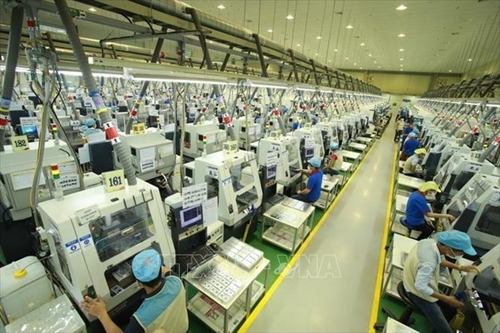The article’s author - Shireen Muhiudeen who is a regional fund manager with more than 30 years' experience, said the FDI inflow into the Southeast Asian country grew 10.4 percent between 2013 and 2019 on an annual basis and posted a record high of 16.12 billion USD last year, an 81 percent increase overall.
    |
 |
|
The production line of Bokwang Vina Co. Ltd. in Thai Nguyen province |
She pointed to a number of bold measures that contributed to such growth like instituting transparency in business and governance processes, and obliging state-owned enterprises to operate in non-competitive areas.
The article said a huge increase in FDI into the country began from 2013 onwards, with Samsung considered a major contributor, which is thought to have invested around 17 billion USD in the country since 2008. Proactive implementation of business-friendly investment policies and industrial zones, as well as the ample supply of young workers, has helped Vietnam attract FDI from other nations, including Japan – one of the new investors in Vietnam’s energy sector.
The writer went on to note that “attracting FDI has not always been so easy”. She said when Vietnam joined the World Trade Organization in 2007, it initially followed the same approach adopted by some of its neighbours and encouraged state-owned enterprises to try and compete with foreign investors.
“But a spate of attacks on foreign-owned factories in 2014 spooked investors, leading the government to ban state-owned enterprises from competing with FDI projects, which helped spur the foreign investment rally seen from 2013-2019.”
According to the article, some may argue that Vietnam’s geographical proximity to China and its young labour force of 95 million are the country’s added advantages, but the appeal of a stable political environment cannot be underestimated.
“Thailand, the Philippines, Malaysia and Indonesia have all experienced their fair share of political upheavals and uncertainties in recent years, and would do well to look to Vietnam to understand the importance of stability,” the article said.
It added that investors also pay close attention to inflation rates, want a stable foreign exchange rate and dislike bureaucratic red tape – something Hanoi has been committed to reducing by implementing e-tax and e-custom services.
The article noted that over the past decade or so, Vietnam has moved from focusing on labour-intensive manufacturing towards more automated processes, and is now entering its next phase.
According to the article, investors are keenly awaiting the release of Vietnam’s Ministry of Planning and Investment’s draft FDI strategy for the next 10 years, which is expected to prioritise hi-tech, high-value and environmentally-friendly projects.
Source: VNA